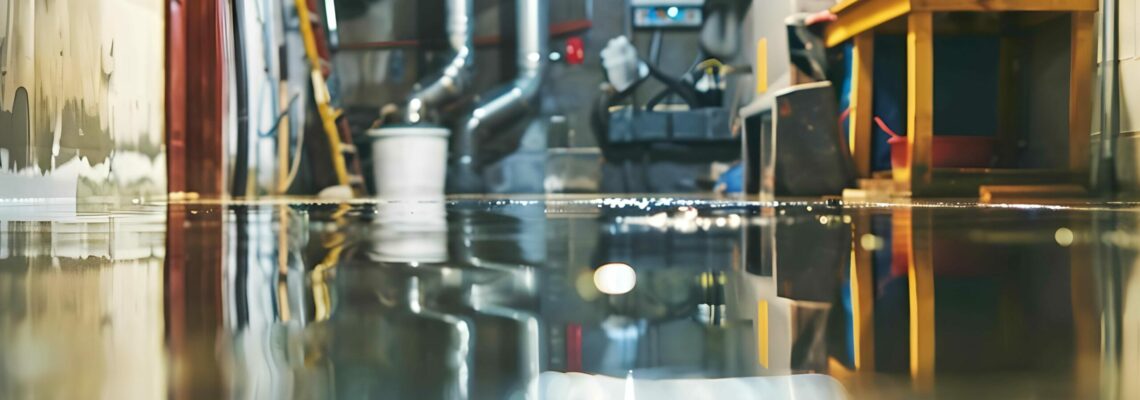Sewer backups are more than just a messy inconvenience. They are a serious health hazard that can pose significant risks to anyone exposed to the contaminated water. Understanding the dangers and how to respond to them can help protect your family’s health and safety.
A sewer backup occurs when wastewater flows back into your home instead of traveling through the sewer system as intended. This can happen due to various reasons, including blockages in the pipes, tree root intrusion, heavy rainfall overwhelming the sewer system, or aging infrastructure that can no longer handle the volume of water.
Regardless of the cause, the end result is having to to deal with a sewer backup in your basement and the associated health hazards to your family.
Immediate Health Risks
The immediate health risks associated with a sewer backup in your basement are significant. The contaminated water can contain harmful pathogens such as bacteria, viruses, and parasites. Exposure to these microorganisms can lead to a range of illnesses.
Gastrointestinal issues are common, as are respiratory infections and skin infections. The severity of these health problems can vary, but they can be particularly dangerous for young children, the elderly, and individuals with compromised immune systems.
Long-Term Health Hazards
Long-term exposure to the conditions created by a sewer backup can lead to even more serious health problems. One of the most concerning issues is the potential for chronic respiratory problems caused by mold and mildew growth.
When a sewer backup in your basement occurs, the excess moisture can create the perfect environment for mold to thrive. Inhaling mold spores over time can exacerbate asthma symptoms and lead to chronic respiratory conditions.
Allergic reactions are another common concern, as the allergens produced by mold can cause significant respiratory distress for those with sensitivities.
Additionally, diseases such as hepatitis and dysentery can result from long-term exposure to contaminated water.
Chemical Hazards
Chemical hazards also pose a threat during sewer backups. The contaminated water can carry industrial waste and cleaning agents, leading to chemical contamination. In addition, toxic gases like methane and hydrogen sulfide can be released, posing serious risks to anyone exposed.
These gases can cause a range of symptoms, from headaches and dizziness to more severe respiratory issues.
Mold and Mildew Growth
Mold and mildew growth is a particularly insidious problem following a sewer backup. The damp conditions foster rapid mold proliferation, which can have long-lasting effects on indoor air quality and health.
Exposure to mold can cause allergic reactions, including sneezing, coughing, and skin rashes. In more severe cases, it can lead to respiratory problems and exacerbate asthma symptoms.
Prompt water damage remediation is essential to prevent mold from spreading and to protect the health of those living in the affected area.
Psychological Impact
The psychological impact of dealing with a sewer backup should not be underestimated. The smell, the stress and the anxiety associated with property damage and health concerns from a sewer backup in your basement can take a significant toll on your family’s physical and mental health.
Preventive Measures
Preventive measures can help reduce the risk of a sewer backup in your basement. Regular maintenance of sewer lines and plumbing systems is crucial. This can involve routine inspections and cleaning to ensure that blockages are cleared before they become a problem.
Installing backflow prevention devices can also provide an additional layer of protection, preventing wastewater from flowing back into your home during heavy rainfall or other events that could overwhelm the sewer system.
Emergency Response
In the event of a sewer backup, it’s essential to respond quickly and effectively. The first steps should include evacuating the affected area to avoid exposure, avoiding contact with the contaminated water, and calling in experienced water damage professionals for help.
Using professional water damage remediation services is vital to ensure that the cleanup is thorough and that all health risks are addressed.
Professional Remediation Process
The professional water damage remediation process involves several steps to ensure that your home is safe and clean. First, a thorough assessment and inspection are conducted to determine the extent of the damage. Water extraction and drying follow, removing all traces of contaminated water.
The next step is cleaning and disinfecting the affected areas to eliminate any remaining pathogens. Finally, restoration and repairs are carried out to return your home to its pre-damage condition.
When To Call The Experts
Hiring a professional water damage remediation company is crucial in effectively addressing any water damage resulting from a sewer backup in your basement. Our experts have the knowledge, experience, and equipment to handle the situation efficiently and safely.
We will ensure that all affected areas are thoroughly dried and cleaned, preventing mold growth and further structural damage. Our professional water damage remediation helps restore your home to its pre-damage condition, giving you peace of mind and protecting your investment.
Understanding the health hazards associated with a sewer backup in your basement and knowing how to respond can help protect your health and safety. Prompt action and professional remediation are crucial in mitigating these risks and ensuring that your home remains a safe and healthy environment.
If you ever need water damage repair in your home after a sewer backup in your basement, call the professionals at PuroClean Certified Restoration. We will make sure that any repair work is done right.


